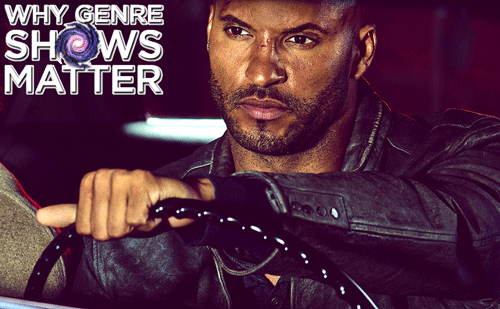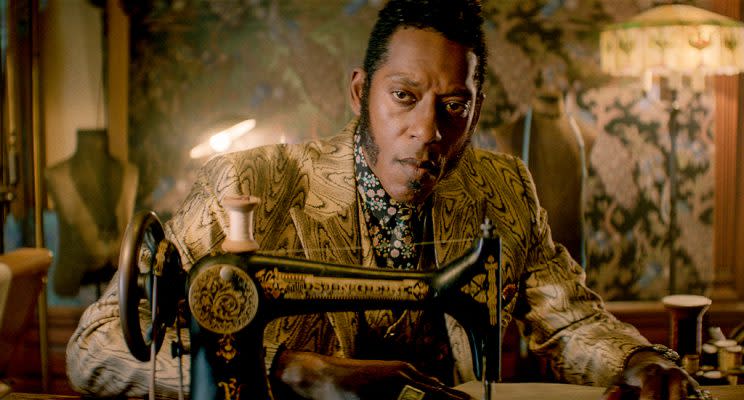‘American Gods’ Creators Go Where Their Unconscious Takes Them

Leading up to the 20th anniversary of the March 10, 1997, premiere of Buffy the Vampire Slayer, Yahoo TV is celebrating “Why Genre Shows Matter” and the history of how these shows have tackled universal themes (such as how much high school sucks) and broader social issues.
One of the interesting things about genre is that, when telling one story about your characters, you often find out you’ve told another unexpected tale as well. As Bryan Fuller, one of the co-creators of the Starz series American Gods, premiering April 30, says: “You tell the best story you can, and the unconscious takes care of the rest.” When we talked to Fuller and co-creator Michael Green about their new show, they revealed how they set out to make something else altogether.
“You look at things like Twilight Zone, it’s so much about coping,” says Fuller. Fears of technology and nuclear war and communist spies all bubble to the surface in a show ostensibly about magic and sci-fi. “There were things people were dealing with, and if you sat down in front of a typewriter at the time, it couldn’t help but come out. Writing is often a means of coping with whatever is going on in your own subconscious, whether you’re aware of it or not.”
The Munsters, which Fuller cites as the first genre show that resonated with him, did so because it was a great family metaphor. “They were all monsters. They loved each other regardless of their monstrosities. In fact, the bigger monster they were, the more that they were loved, and they still loved you even if you weren’t a monster at all like Marilyn,” he says. Even though everyone else hated them, they held together and accepted each other for who they were. “That’s the basis of that show, and on top of it you get to tell these great sitcom stories with Herman’s adventures at the morgue.”
Related: 15 Genre Shows That Helped Shape TV Today
Small wonder, then, that Fuller’s first big break in Hollywood was writing for the Star Trek series Deep Space 9, which was another genre show about misfits who became a family. Set in a space station rife with political turmoil — the planet Bajor is dealing with the recent occupation by the invading Cardassians — and populated by aliens who were often openly hostile to each other, they learn to trust each other.
Captain Sisko arrives at the station in the pilot with his son in tow, both still reeling from the loss of the captain’s wife. “That was a wonderful metaphor of a father and son discovering each other after the loss of one of the family and then trying to put the pieces back together,” Fuller says. Even though the show is driven by its politics — which were an amalgamation of various Middle East conflicts (this was after the Cold War and as the U.S. was dealing with the repercussions of the first Gulf War) — Fuller feels an intimacy with the show for that father-son relationship. “Every conflict with the Cardassians or the Bajorans did have this underlining metaphor of ‘this is what it takes to rebuild something that has fallen apart,'” he says. “Bajor has fallen apart and it needs to be rebuilt, just like Sisko’s relationship with his son has fallen apart.”
American Gods, according to the book’s author, Neil Gaiman, is a coming-to-America story, filled with tales from the Old Country and what happened to them when they emigrated here. The question then: is it luck or a premonition from the unconscious that Fuller and Green chose this story just before the issue of immigration took on a new and frightening hue?
It certainly wasn’t intended as a political statement. First and foremost when adapting the book for TV, they looked for emotional stories. “There’s that story of Salim leaving the gym, and it’s a gay Muslim story. We were very moved by this very touching story and — on the off-chance it was a one-season show — we wanted to make sure that it appeared in that season. Because we wanted to see it,” says Green. “When we chose it, the word ‘Muslim’ was not something that we thought would be so electrifying.” (And certainly, it wasn’t when it was first published in July 2001.) “That wasn’t part of the decision-making,” Green says. “We were just moved by it on an emotional level.”
Related: ‘Black Mirror,’ ‘Westworld,’ and 13 Other Genre Shows That Are Tackling Issues Well

But stories do take on new resonances, and it’s difficult to pin it on luck when it’s a regular occurrence. Orlando Jones plays Anansi, an African god who speaks to slaves as they are being shipped across the Atlantic. “After the first take of Orlando giving this monologue to a group of 40 black actors, they erupted in applause,” Green says. “At that point in the production process, we were just trying to tell a truthful story from our point of view — neither of us being black men. Then seeing that it spoke to these people, in a way that was inspiring for us and it felt to us for the first time, we were like, ‘Oh, maybe we were actually being part of a conversation that has to be had.'”
They weren’t setting out to be political, but genre can be funny that way. “We’re very proud of the coming-to-America stories,” Fuller says. “We told them because we were very moved by them as reminders of how we all got here. And when we made them, we thought everyone would be moved by them too and were very surprised to find out by the time it airs — especially after November — those immigration stories have become far more political than we would have ever expected. If people are moved by them, so much the better. If people are challenged by them, that’s there too, and not a bad thing at all.”
‘American Gods’ premieres Sunday, April 30 at 9 p.m. on Starz.
Read more from Yahoo TV’s ‘Why Genre Shows Matter’:
‘Buffy the Vampire Slayer’ 20th Anniversary: 20 Genre Show Producers Pay Tribute
‘Luke Cage’ Showrunner Cheo Hodari Coker on Embracing Exploitation
‘Farscape’ Star Claudia Black Revisits Aeryn Sun’s On- and Offscreen Feminist Journey
‘Battlestar Galactica’ EP David Eick Revisits 5 Episodes That Remain Relevant
‘The Expanse’ Co-Creator: If You Have Something to Say, ‘Invite Them in With Genre’

